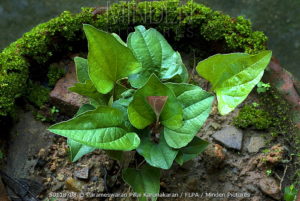
Aarogyappacha
In December 1987, a team of scientists was on a botanical expedition in the Western Ghats in Kerala, India. They had taken with them a few members of the Kani tribe as their guides. The scientists noticed that the guides were eating a plant that seemed to keep them energetic even during tough treks. When the scientists tried it, they too felt a “sudden flush of energy and strength”.
Initially, the Kanis were reluctant to reveal any information about the plant, saying that it was a sacred tribal secret not to be revealed to outsiders. After considerable persuasion, the tribals showed the team the plant Aarogyappacha as the source of the fruit.
The scientists, who were from the Tropical Botanic Garden and Research Institute (TBGRI), secured specimens of the plant, and conducted investigations. They found anti-stress and other beneficial properties in the plant’s active ingredients. Using Aarogyappacha and three other medicinal plants, they formulated a drug and gave it the name Jeevani.
TBGRI gave the right to manufacture the drug to a private company, Arya Vaidya Pharmacy (AVP) for a licence fee of Rs. one million and a royalty of 2 per cent. The Institute, however, wanted the Kanis to get a part of the benefits as compensation for sharing their knowledge of the plant and its properties. The Kanis were to receive half the fee and half the royalty. This was the first case of an indigenous community receiving compensation in exchange for their traditional knowledge of plants and their uses.
The Kanis formed a trust, which would use the money for promoting the welfare of the community, preparing a biodiversity register to document their knowledge, and promoting conservation of biodiversity.
A model for all to follow? Well, there have been problems with this arrangement. The deal had been made with the Kanis of one panchayat area and the Kanis in other areas felt that they should have been consulted too. Another criticism was that the medical knowledge of the tribe had been taken away without involving the Kani medicine men. The amount of compensation was also considered to be too low.
It was also not clear whether the Kanis had the right to grow and harvest the plant in the forest area that they did not own. The plant was not in the list of minor produce that the Forest Department had allowed the locals to exploit. There was also no protection against outsiders coming into the game.
Worse was to come. By 2007 or so, the patent expired and AVP as well as 11 others are now producing the drug while the tribe is completely cut off from the benefits. The trust, which was started with a corpus of Rs. 10 lakhs has exhausted its funds and is subsisting only on the basis of the royalties paid; it is barely enough to pay the bills. Furthermore, the trust members are in the dark about the agreement between the TBGRI, AVP and the Kani tribe. Besides the down payment of Rs. one million and a royalty of Rs. 250,000 received during 1999 – 2005, the trust has received no further funds even though Jeevani has become wildly successful.
The Kani-TBGRI case shows that, even with good intentions, it is not easy to ensure that indigenous communities get benefits from sharing their knowledge of biodiversity. The case, however, is a landmark in this field.
Afterword: This story is based on the book Sharing the Benefits of Biodiversity: The Kani – TBGRI Deal in Kerala, India, by R.V.Anuradha, published by Kalpavriksh, Pune, as well as more recent news reports.

When something turns into a commodity and is commercialised, it has its own travails. The matter had remained silent, and under the carpets, until scientists happened to get a glimpse. Creating a model, and standardising an issue, is more for convenience and the attempt should have been to have considered it holistically. There are both advantages and disadvantages, if the trust factor fails. Left to itself the situation would have carried on as usual without bringing in the element of desire, that the scientists on one hand and the Kani tribe on the other had to fall prey to. The trust factor should have worked, in improving the lives of the Kani tribe, without having to link it with the discovery. Again the intervention of the forest department and the associated politics running with it, brings in a new dimension to the whole episode. Free for all, after the expiry of the licence, created yet another dimension, altogether forgetting the initial motive with which the intervention was on-boarded. The cunning and clever mind has a part to play on human values as we no longer believe in mutual trust in our growth and development. We have almost forgotten that we are mere custodians of this wonderful world, but behave as if we are its lords and often it is the rich and the mighty that rule the roost.
capitalism contaminates the souls of people…